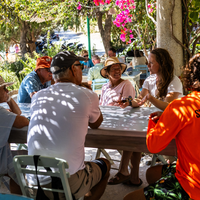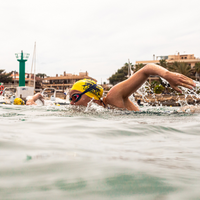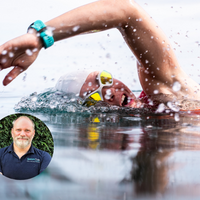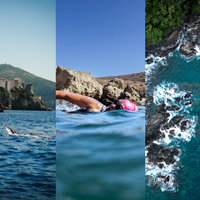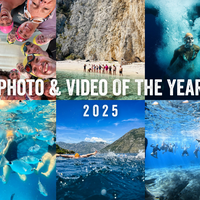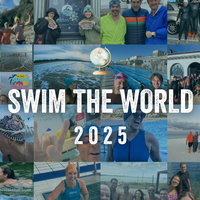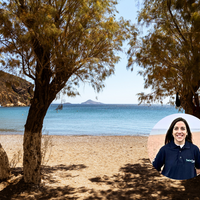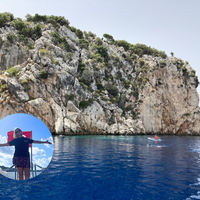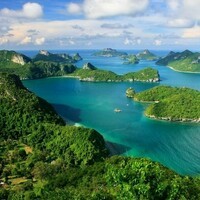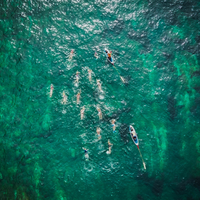The Oceans Seven is one of the toughest challenges an open water swimmer could ever face. Seven gruelling crossings around the world. Each with their own unique set of difficulties, kindly designed to 'take a swimmer apart'...
Beth French is a self-employed massage therapist and single mother from Somerset, once wheelchair-bound as a teenager due to chronic fatigue syndrome (ME). She is also a world record-holding marathon swimmer, who discovered an innate love of open water in her early 20s, in Hawaii. Later, she became the first person to swim from Cornwall to the Isles of Scilly and discovered a taste for endurance, alongside an ability to overcome primal fears of dangerous animals and deep waters, as well as physical resistance to hypothermia, wild currents and soul-sapping fatigue.
In her latest challenge, Beth set out to complete the Oceans Seven to inspire her son, Dylan (who has autism), and to also defy all expectations in a world in which ‘women are not meant to be ambitious’.
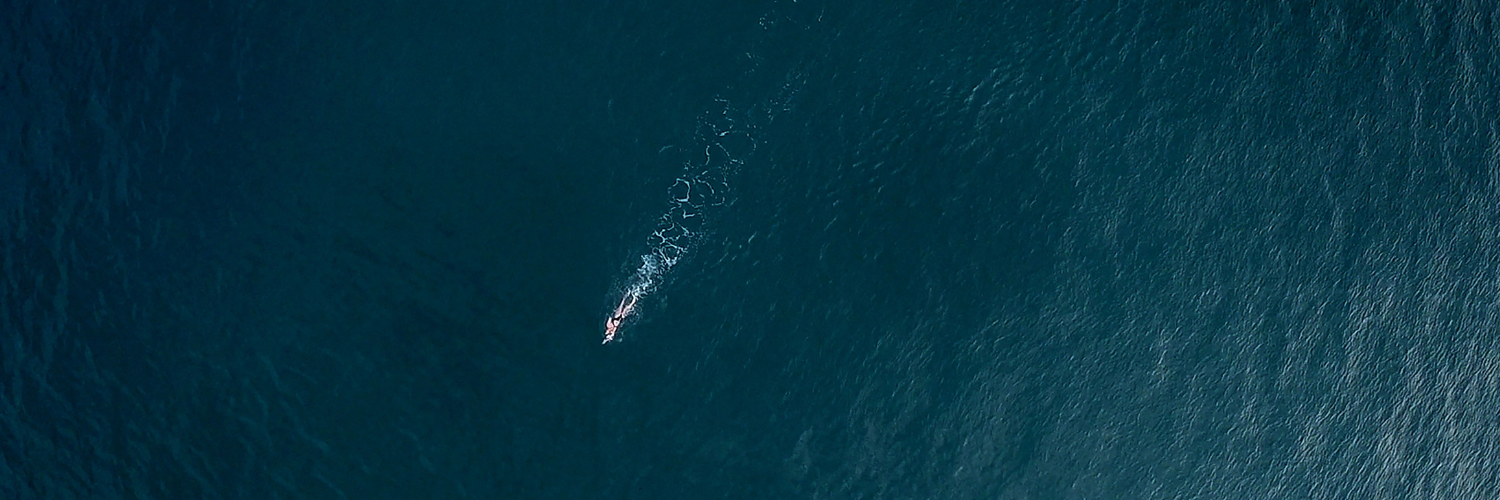
The Oceans Seven
The list of marathon swimmers who have crossed these seven straits is very short and starts with Stephen Redmond from County Cork, Ireland. The swims distances and locations are:
- North Channel (34km between Ireland and Scotland)
- Cook Strait (26km between New Zealand’s North and South Islands)
- Moloka’i Channel (44km between Hawaiian islands: Moloka’i and O’ahu)
- English Channel (34km between England and France)
- Catalina Channel (32km between Santa Catalina Island and Los Angeles)
- Tsugaru Strait (20km between Japanese islands: Honshu and Hokkaido)
- Strait of Gibraltar (16km from Spain to Morocco)

Against The Tides
Beth's story has now been told through a new feature-length documentary, Against The Tides, which screened on March 8th this year for International Women’s Day. The film was produced by a Bafta-nominated team and directed by Stefan Stuckert (Peep Show). The footage looks incredible and the story tells Beth's dramatic journey through heart-rending inner turmoil, centred on the bond between mother and son. The film premiered at the International Sheffield Documentary Festival (Docfest) and was nominated for Best Documentary at the Austin and Marbella Film Festival in 2019. It also won Filmic Prize at Copenhagen's Nordic Adventure Film Festival.
We chatted to Beth in the wake of the film's screening to learn a little about what she went through on her incredible Oceans Seven journey:
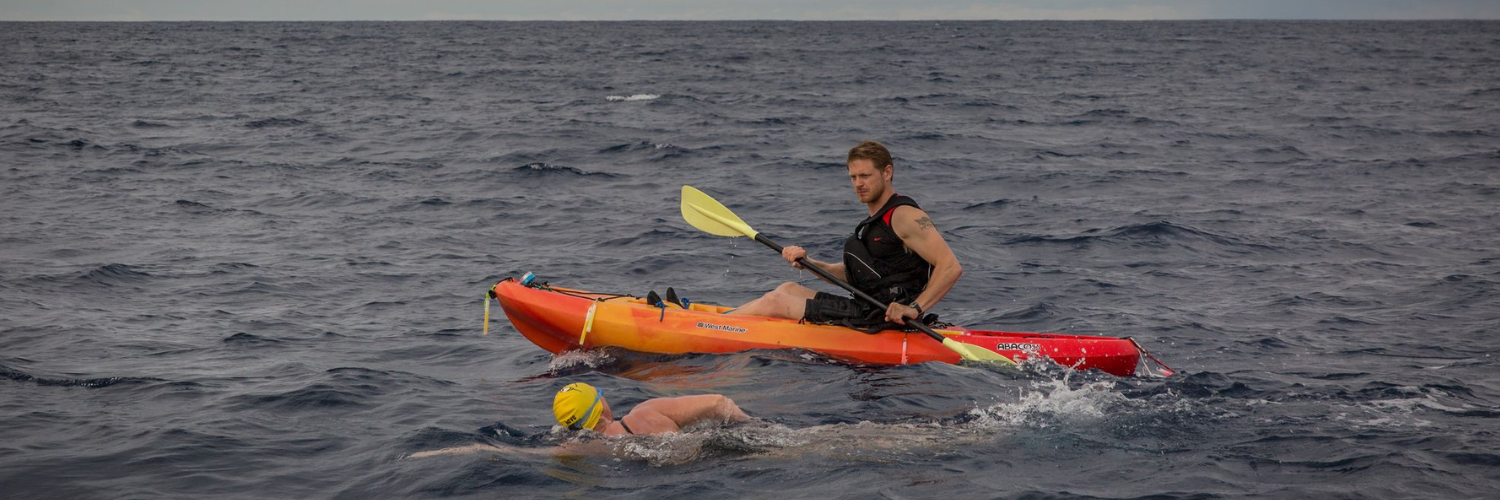
What was your earliest memory of being in water?
Beth: "My earliest memory of being in water is my earliest memory. I grew up pre digital cameras and there was pretty much not a photograph of me where I’m not in water. So, yeah, I was the proverbial water baby. I learned to swim at the age of three and I'd been in the water before then. So yeah, I remember we had streams on the little farm where we lived and that's kind of my earliest conscious memory - going down to the streams with my sisters. I mean, to me, there's no such thing as wild swimming. That's just what you do. Isn't it? Just need to watch when you get in. And I might pull my poor son sometimes. He is a water baby as well. So he'd jump in a stream and I’d strip down to bra and pants and that was just normal, really."
The Oceans Seven is regarded as one of the world’s most extreme swimming challenges. You set out to complete it in less than a year – do you remember the moment you realised this ambition and started training?
Beth: "The moment came about 13 hours into a 24 hour swim. So, I was swimming a channel in Hawaii. Um, four months earlier, I had swum the English channel, which was my first of these swims and I'm on my second swim – I just realized I could do this thing where you unplug the part of your brain that says: ‘You're tired. You need to stop now’. That almost spoiled channel swimming. It was proof that I could manage my ME symptoms and still do wild things. So for me, about 13 hours into the Molokai tunnel, I suddenly thought I needed to look for another way of making these channel swims worth training for. So I saw this Ocean Seven thing, with this list everyone was talking about at the time. I was like: ‘I want to see if it's possible for me to recover from one channel to the next and see if I can do them all in a single year’. I'd been swimming for 13 hours. I was probably delusional at the time. Um, so, you know, I thought, well, it's only seven days of swimming in a year. That sounds lovely."
'I just realized I could do this thing where you unplug the part of your brain that says: ‘You're tired. You need to stop now’...'
"When I did start to talk to other channel swimmers, they were like: ‘that'd be amazing if you can get everything lined up in a year’. And actually the swimming was the easy part. You know, the logistics were an absolute nightmare. The associations oversee the different channels and usually have pilots attached, or you have to get access to a pilot yourself. All of the different associations have different prerequisites. Whether you have to swim under 16 degree for one. You might have to swim 6 hours under 13 degrees for another. You have to pass different medicals that come in at different times. So, it was really quite a juggling act to even think about trying to organize the thing."

We heard that you deprived yourself of food and sleep to get used to swimming with exhaustion and hunger. Did you have a go-to food once you finished a hard swim?
Beth: "Sporadic torture - that's what I call it. The thing is, you never know when you're going to swim, you can't say right next Wednesday or Wednesday, the 23rd of September, I will be swimming a channel. You don't know until the day before if it is definitely going to go ahead. So, you never know if you're going to be as well rested as you want to be. And the other thing that I had to face was the fact I'm a self-employed single mum. I have to juggle training and fit it all in. You can't fake swimming for 16 hours very easily. So I would kick myself into, you know, basically yes, not sleeping very much, which was easy with a two year old in the house. Then I would work all day the next day, doing a very physical job, not eat and do a technical session in the swimming pool, where I only had two hours of a window to train. I was usually sleep deprived and I had to expose different aspects of my stroke to work on. That would be problematic when I was tired. I never trained more than about four times a week. Um, partly because I know that if I train more than that, I start to not be able to recover from my ME symptoms. So I would have to try and be really smart. If I had like, say, a two hour window after work, obviously that would be in a pool because I couldn't guarantee the weather would be good, right? Through Winter I would do cold water immersion because you know, it's 16 degrees when you swim. The English channel is bearable for the first couple of hours, but actually after 10 hours, it’s a different story."
'Sporadic torture - that's what I call it...'
"I much prefer swimming outside though. I also trained by towing my little boy in a dingy from when he was aged three. He wanted me to take him and as he got bigger, I got stronger. And then we would end up doing an hour in the water and an hour out playing on the beach. Then an hour in the water and an hour out. So you get six hours of swimming in a day pulling a growing lump."
"When I'm doing big, long swims in the water - I have very simple food. I use it as fuel basically. So I have freeze dried coconut water, which is a natural electrolyte with a simple carb solution. I'll use maltodextrin. Then if I get really low, I use Ovaltine over the course of my training. I developed different recipes so that cake wasn't a dirty word. I'll use multi extract instead of sugar and I use a lot of nut flours instead of wheat flour and I make the best malted coconut chocolate fudge brownie, which is just my go-to training fuel. It's all functional fuel. The cake has almost no sugar in it. So it's a slower burn and you've got lots of folic acid. So it's really good for you. It's pretty healthy, but it tastes like great."

You described the seven channels as being designed to ‘take a swimmer apart’ – between hypothermia and jellyfish and sharks – was there any one aspect that was most difficult to overcome?
Beth: "When I first started thinking about the English channel, the distance wasn't really the scary part. It was the cold. When you're looking at Northern Ireland to Scotland and it could be you're swimming for 12 hours in 13 degree water, that was actually quite a scary prospect. And, when I did one of my attempts it was 14 degrees. Um, so eight hours. That's pretty tough. You know, life isn't that fun after a while. You kind of go numb. So you didn't know if you're pulling too hard, so you're, you're going to blow your shoulders out. Or if your arms are just spinning and not getting any grip. Actually, I found my jaw hurts for days afterwards because you end up clenching your jaw as the muscles get so tight. Um, so yeah, it's just a different world and you, yeah, you can't think straight."
Some of these crossings can take between 14-20 hours – what was your longest stint spent swimming? And did you have any tricks to occupy your mind?
Beth: "The biggest stint I ever did in the water was 24 hours and 10 minutes. The longest channel I've done was 19 hours and 6 minutes. I ended up being ordained as a Buddhist nun and studied intensive forms of meditation. That is basically what I do when I'm swimming. And it's such a natural kind of meditative process, you know, swimming face down in the water and just having your arms ticking like that. Um, so yeah, being able to kind of have that background of having done it very intensely, um, meant that I could just gently shepherd my mind to just stay sane. People do it in different ways. I know some people who sing songs in their mind. For me, I swim for the peace. I swim for that meditation. So for me, it's natural just to do that for hours on end."
'For me, I swim for the peace. I swim for that meditation...'

Several hours in to one of your swims you saw the dorsal fin of a tiger shark – a swimmer’s worst nightmare! Can you describe what that moment was like? And how you and your team responded?
Beth: So what happened was – I was in the Moloka’i channel [at night] and the Pacific water moves so much, the pilot boat can't stay right alongside you for safety reasons. I have a kayaker alongside me, but the boat kind of leapfrogs ahead. The pilot boat is lit up like a Christmas tree. I've got a light on the back of my head, so the pilot can see me. And I lifted my head to take my hourly drink and literally within 30 seconds of the boat having pulled ahead, the kayaker says: ‘please don't panic but there's a shark behind you’. And so we were in an eight foot swell. So the pilot boat didn't have a hundred percent visibility of the kayaker. They could only see him every minute or so. And so the kayaker was signalling and flashing his head torch to the boat to say there was a shark. The shark sloped down and came and literally swam underneath me and around and rested his nose against the front of the kayak. Only I didn't know at the time because I was obviously level with him in the water.
'...it's one thing to know that there are sharks in Hawaii, but another thing entirely to know that a shark knows exactly where you are and is very close...'
Obviously you don't want a light shining in the water normally in the dark because light attracts little things and little things attract bigger things, and bigger things, you know, bite you sometimes. But you really need to know what's going on in that moment. So the kayaker, he turned his head torch on main beam and was shining it down so we could watch, you know, and see where the shark was. And yeah, so I lifted my feet because I could see it looming underneath me, but it went round to the side of the kayaker. He knew where it was. Mostly I couldn't see and it was less than two meters from me for about six or seven minutes, before the pilot arrived. They circled back around to find out what was going on. Well, you know, we were just very still and very calm. And it was very - it was very surreal. Um, we actually, I went heads up into treading water, because if you lie on the surface of the water and are splashing, it looks like prey - like a dying fish. And we're not their natural food. Um, so staying upright, and treading water and staying calm was the best thing. After that the reality hits and, you know, it took me an hour to get my face down in the black water again. So I was doing a bit of a heads-up breaststroke - it's one thing to know that there are sharks in Hawaii, but another thing entirely to know that a shark knows exactly where you are and is very close.
I had watched lots of documentaries about sharks. I'd watch lots of, um, lots of YouTube videos with divers who swim with sharks, not in cages, but actually go and spend time and learn their behaviour. Um, so, you know, if you get comfortable with that, theoretically, you know, in your mind's eye - I knew exactly what to do and you kind of play it through in your head. So it's not technically... you shouldn't be shocked when it happens. I mean, you never really know. And you know, it was really dark, which was one thing I hadn't really stored in my head. I'd always imagined watching the shark approach and not, you know, not turning my back and being nice and calm. You know, we're pretty good at killing sharks and they're not very good at killing us, in all honesty. We do far more damage to them than they do to us. They just scare us because we've got that Jaws music. And it was a juvenile - it was about seven foot. It was just very curious.

Your son was obviously a huge inspiration for you. During your fifth crossing you said you hit a maternal wall and realised nothing was more important than Dylan. How is Dylan? Has he watched the documentary? And do you think he has caught the swimming bug?
Beth: Dylan is now nearly 13. I believed I couldn't get pregnant when I was in my twenties. I was told I couldn't. So getting pregnant with him was a bit of a miracle in and of itself. And, you know, I was not in a particularly stable relationship. So I was going to be a single mumif I was going to do this. And it was like a real challenge, but I thought, well, this might be my only chance to be a mum. So I took it as an adventure. And to me, that was always my number one thing to take him with me on adventures. Knowing that he had special needs very early on, I realized that, you know, maybe quote/unquote - 'normal' - wasn't going to be for us. I just didn't want him to feel restricted by not being normal. Not being normal doesn't mean you can't do stuff. It means you can do different things. So, he has seen the documentary and the first time he saw it we kept stopping and talking about what was going on. And he said to me at the end - 'it's very sad watching your life before your eyes, but good television needs big emotions'. It's um, you know, he hasn't necessarily caught this swimming bug. Like I said, he's a water baby and he actually got me to surf with him. I lived in Hawaii for three years and never got on a board! So, I think he likes going up and down in the water. He's more likely to be a free diver than a swimmer.
'Knowing that he had special needs very early on, I realized that, you know, maybe quote/unquote - 'normal' - wasn't going to be for us. I just didn't want him to feel restricted by not being normal...'
If you’d like to watch the film trailer and learn more about Beth's story, head to the Against The Tides website!


